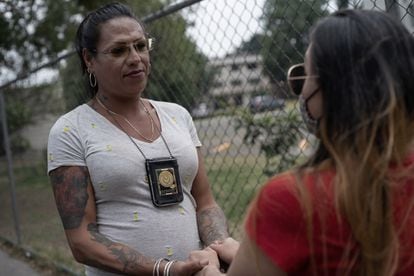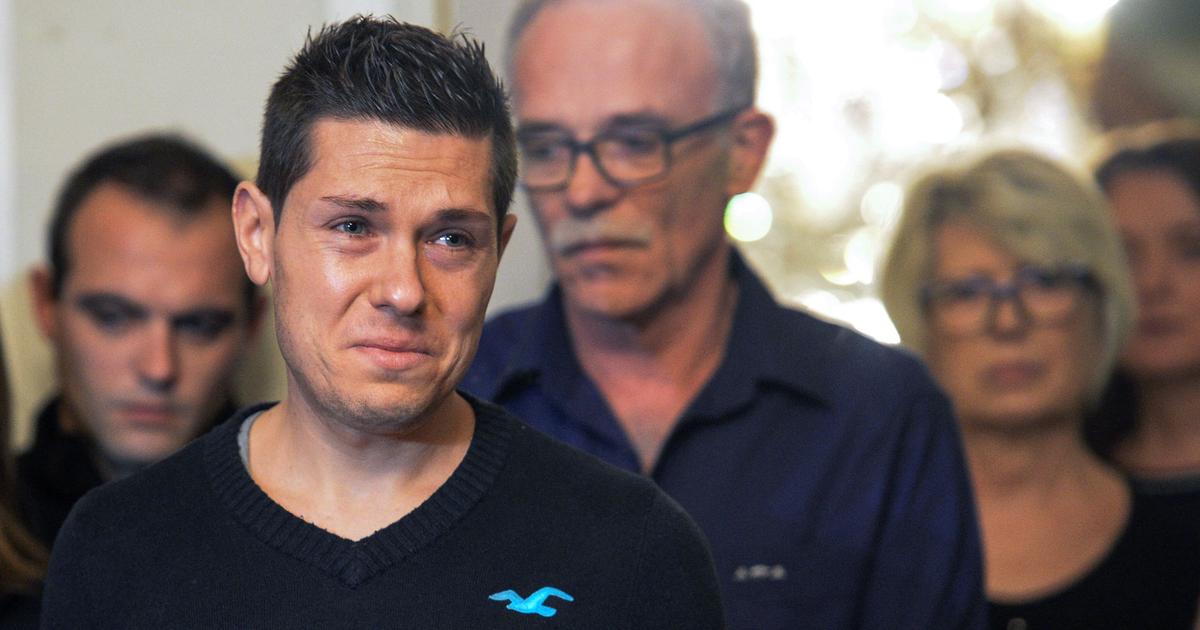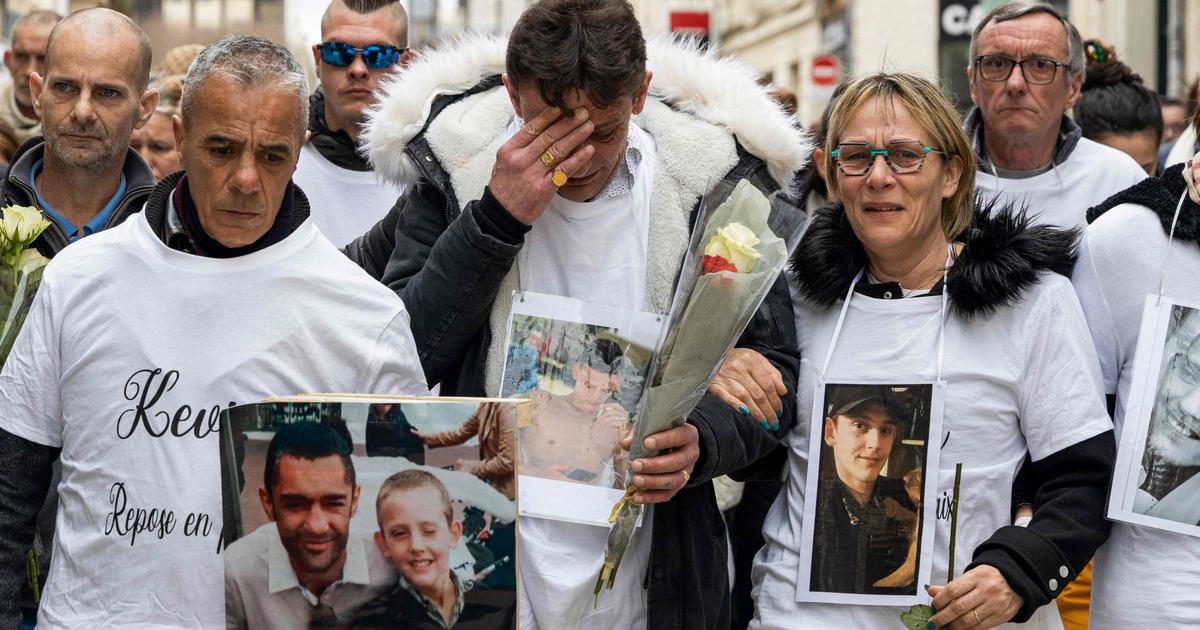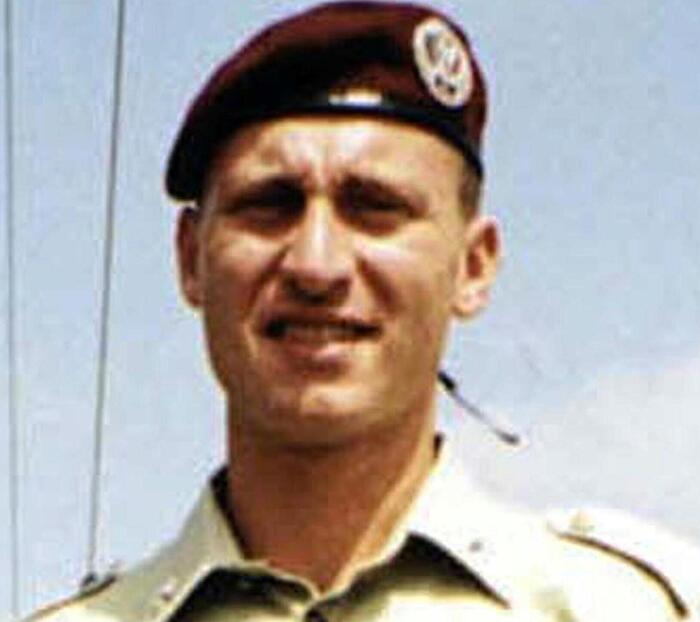He was 26 years old and had very large eyes, always outlined in black.
Eight years ago she had left her town, a municipality in Las Choapas, in the State of Veracruz, "to change her life" she had told her mother;
to show his transsexual identity without causing conflict or sorrow.
When she arrived in Mexico City she began to wear stiletto heels, a very short skirt, she called herself Naomi Nicole, although everyone knew her as La Soñaré.
The only resource that was presented to him to get ahead in the capital was sex work, to which he dedicated his body and the hours of the night parading through the darkest sidewalks and alleys of Guerrero, the Mexico City neighborhood where, March 23, 2020, two soldiers who had requested a service ended his life with a shot.
On Friday, May 6, the only direct witness to the crime testified for the first time at the sixth hearing for the murder of La Soñaré.
“It's been more than two years, but I can't get those images out of my head.
It can happen a lifetime that there are things that are never forgotten.
It took me months to testify because I was very afraid," confessed Rosy, with a fictitious name and a friend of the victim, before appearing in room 3 of the Courts of the South Men's Preventive Prison in Mexico City to testify against those accused of the murder of her friend Naomi: JLC, 31, and AAR, 30, both corporals from the Secretary of National Defense (Sedena).
The death of La Soñaré constitutes the first case of transfeminicide in Mexico in which those accused of murdering a trans woman were arrested and are serving preventive detention.
"And the most important thing of all is that they are soldiers who were active at the time she was murdered," says Kenya Cuevas, activist and director of the Casa de Muñecas Tiresias organization, an association for the defense of the fight for human rights. humans of LGBTTTI populations.
“Seeking justice for Naomi has put my life at risk.
Those guys are military and they don't mess around.
If they go free, they will come for me”, Rosy confessed, hiding her gaze in mirrored glasses and holding her trembling hands before entering the room to see the defendants again, whom in 2020 the judge imposed preventive detention as caution.
“They could not be locked up for more than two years, but due to the pandemic the legal terms of the process were suspended and, as long as the investigation progresses, they will continue there,” Cuevas explained, who also declared as an indirect victim: “In our community we created our own family and Naomi, whose life was vilely taken, belonged to mine.
Two shots in the night: the first bullet in the air, the second in the forehead
The events occurred around four in the morning on March 24, 2020, when Rosy had just finished a service.
“
I had gotten into the vehicle of a client who, after discussing the price of oral sex, offered me much less than what I had asked for.
I ended up accepting because she told me that she would give me her stone, and then I smoked it, ”said the main witness from a room where only the magistrate court, made up of three judges, could see her face.
“Within 15 minutes of finishing, the client turned around on Avenida Insurgentes and left me on Calle Estrella, without giving me a single bit of the drug,” Rosy acknowledged later.
According to her testimony, after providing the service, she had squatted behind the cars to take out a small mirror and touch up her makeup for the next shift, at which point she saw a red car come to a sudden stop and recognized a figure Between struggles, she got off him.
It was her friend I will dream of it.
"I immediately realized that it was her, her shrill voice, her silhouette... Between us we recognize each other until the shadows!", Affirms the witness.
“We had only known each other for a few years, but we had become good friends from walking through the same areas, through Revolution, the Alvarado Bridge, through the streets of Zaragoza and Orozco and Berra, where we used to
bitching
outside the Polly Hotel, we both worked in that area”, she details.
In her first statement, from an isolated room where she could see those accused of La Soñaré's murder, Rosy summarized what happened when the victim got out of the car and one of the defendants got out after her.
"Naomi ran between the cars parked in a row and the guy who was the co-driver pulled out a gun in his right hand and fired," says the witness who, crouched next to a squat wheel, she watched everything.
The impact of the bullet, the first that would resound in Estrella de la Guerrero street that night, did not reach more than the air.
“After shooting he turned to where I was, and I thought he had seen me.
I was only 15 meters away, quiet.
My whole body was shaking and my legs were paralyzed.
The memories are confused, but I could see the face of that man, ”says the eyewitness who, for the second time in her life, yesterday saw one of the faces that still give her nightmares.
"He was dark, a little taller than me, he wore blue jeans with a black sweatshirt, with a cap or hood," she doubts in the last detail.
When Naomi ran in her heels until she reached a flower bed, the assailant, with a gun in his hand, caught up with her.
The victim tried to defend herself from her, but the soldier punched her in the face followed by a blow to the mouth with the pistol.
"Naomi fell to the ground and, at that moment when she was completely unprotected, the guy fired without hesitation," says Rosy, who closed her eyes and could not see where the bullet had hit her friend. .
"Then I saw the blood splatter and I knew she was dead," she says.
In her version of events, the witness stated that, upon hearing the shot, the second defendant got out of the red car.
“He was wearing a black sweatshirt with a light stripe, he had glasses, he was rougher than the other.
When he approached Naomi's prone body, which was not moving, he kicked her with his right foot to see if she would react, ”Rosy narrated with a broken voice.
The second detonation was the one that alerted the neighbors, who looked out to see what was happening.
"I didn't see them, but the one who was driving and kicked Naomi threatened them with a gun and yelled at them to see what the gossips wanted," the witness continued.
The next thing she remembers is "that the two soldiers got into the car and started at full speed with the lights off."
Someone called 122 and operators from the regional stations in charge of monitoring the video surveillance cameras alerted the officers who were patrolling the area at that time that there was a firearm victim on Estrella Street.
“I didn't make the call.
I was so terrified that when they fled down Heroes Street, I ran to a small park thinking that they might have seen me.
The last thing I managed to see was a Mickey Mouse decal that he had on the rear windshield of the red car.
Within hours of arriving at Revolución, where the rest of my companions gathered, they had all already found out what had happened,” recalls the witness.
By the time paramedics arrived, the victim's body was lying prone, without vital signs and with a shot to the forehead.
The video surveillance cameras and the illumination of the streetlights allowed the authorities to monitor the aggressors and warn that they were circulating on Moctezuma Street.
When joining the Paseo de la Reforma and Río Rhin, already in the Cuauhtémoc neighborhood, the red car in which the defendants were exceeding the speed limit crashed into the Glorieta de la Palma, where they were intercepted by a patrol.
The police that carried out the inspection only found a firearm with seven cartridges.
But the direct witness affirms that the two men were armed.
"Each one had a gun," Rosy said on different occasions during the hearing.
"What happened to the other gun that we don't know anything about?" Cuevas asks.
“They could have dumped her on the run, thrown her out the window anywhere.
It's about the military, they all know it.
That is why the statements of the only witness, who took months to testify, are so decisive!”, says the activist.
The murder of Paola Buenrostro: the beginning of a fight
After their arrest, the defendants refused to take the blood alcohol test and the rest of the routine expert opinion.
“They knew how the protocols work and that they had the right not to testify or allow themselves to be tested.
They didn't even do ballistic tests to look for gunpowder on their hands.
What has distorted the investigation, as happened with Paola Buenrostro”, Cuevas denounces, recalling the case for which he began his activism.
“Paola's death marked a before and after;
it marked the history of our struggle and was able to make visible the impunity that surrounds violence against trans women,” says the activist, who has not stopped fighting battles to defend her community since she witnessed how an ex-military man murdered her best friend.
Before being recognized as the woman of the year by the Congress of Mexico City in the category of Human Rights in 2020, she triggered the movement to demand the criminalization of transfeminicide in the capital city.
"Paola's murderer is still free but last October the Human Rights Commission of Mexico City issued recommendation 02/2019 where it described her death as transfeminicide," says Cuevas.
For the way the case was conducted, she also received a public apology from the Attorney General of Justice, Ernestina Godoy.
The activist Kenya Cuevas with Rosy at the exit of the courts, after she testified against the accused.
Seila Montes
Between the recognition of bodies and officiating at funerals
Known as Mama Kenya for years by some of the most vulnerable and stigmatized groups —trans and homosexual population, drug users, sex workers, migrants, people who have just been released from prison and with HIV—, Paola's crime further strengthened the Cuevas' activism and influence.
Every time there is an attack against someone from a marginal community, she is one of the first figures they go to.
“Like when I received a call in the middle of the night on March 24 from one of the compañeras from the Revolution to tell me that they had killed Naomi,” says Cuevas, who, after hearing her word, ran to identify her body.
On the way to the Institute of Forensic Sciences (INCIFO), where an autopsy was being performed on the recently murdered woman,
communicated with a contact of the Attorney General of Justice of Mexico City.
"They assured me that they would undertake to investigate the murder from the gender protocol and that the file would be reclassified as transfeminicide, but since it is not classified yet, the murder of La Soñaré is being treated as a cautious homicide," says the activist.
During the hours in which she contacted the relevant authorities, arranged paperwork and sent messages to find the victim's family, Naomi was dismissed in a white coffin by candlelight and with a crown of flowers at the Garcia Wakes, in the Algarín neighborhood of the Cuauhtémoc Mayor's Office.
The impromptu funeral, which was attended by some of the victim's companions with glitter on their faces, began at eleven o'clock at night on March 25 and lasted until the morning of the following day, leaving as a trace of the requiem ashtrays full of butts, glasses bottles with coffee grounds and empty bottles of anise.
Volunteers from the Casa de las Muñecas Tiresias organization were the last to bid farewell to Naomi's body before it left in a hearse in the morning for the Veracruz municipality of Las Choapas.
In his homeland, the family was waiting for him for a second wake.
“In which there were no shows that we organized, but there was music and a lot of food.
They didn't stop bringing out trays of atole, pozole, tamales... The whole town came out to welcome us very grateful, so much so that they wouldn't let us go back," says the activist who had traveled more than 10 hours in the black car to reach the town of the Olmec region at midnight.
“If it hadn't been for Kenya I wouldn't have found out, and my son's body would have been left lying there in the street.
Now I just want justice to be done, "added her mother a few days after learning of the misfortune.
From the other end of the phone, she also told that the father had abandoned the family when Naomi was little and “had never cared about her children.
He was one of those guys.
We are from the ranch and I would not have accepted that she had become a woman.
In the city she is different, that is why she left, here in the country it is not the same, she could not be who she wanted to be.
We used to talk on the phone from time to time.
She told me she was fine and not to worry.
She was always a good person, hardworking, she helped us a lot in the field.
I don't know how his last years were far away in the city, so he was a very cheerful boy”.
“Although at first she seemed haughty, Naomi had a huge heart.
She was very loud, with a lot of personality.
All of it a chaos!
I would die of laughter as soon as I heard her talk about her, with her village accent that caught her attention so much… And always with her eyes very painted black”, Rosy remembers her.
She still keeps some shoes that Naomi had bought.
“They were too small for him;
she wore size six, I wore four, so she gave them to me.
I never put them on, but here I have them like a treasure! ”, Says her friend remembering the last time she would speak with the victim.
"The next time I saw her, they killed her," lamented the witness, whose voice broke on three occasions during her appearance.
“The questions ended and I collapsed in tears, from pure anger and also from joy.
I am very happy for my friend and for us.
I feel like justice is finally going to be done!” she exclaimed as she wiped the trace of mascara from her face with her fists as she left the room.
"There is still no sentence and there are several sessions left, but with the evidence that exists and today's testimony, everything indicates that the guilty will receive a firm sentence," concluded the head of the transfeminicide unit of the Femicide Prosecutor's Office, who accompanied the witness out of the courthouse.
Next to the wire fence that surrounds the judicial precinct, while waiting for the patrol that would guard her until the hotel room where she sleeps during the day and serves clients at night, Rosy hugged Cuevas and the rest of the colleagues from Casa de the Tiresias Dolls that are escorting him in the judicial process, a historical precedent in the fight for the rights of the trans community.
“As soon as I get home I'm going to light the candle I bought for my Santita Muerte and put a glass of anise for her and another for me;
I have to pray to my mamacita that everything goes well and that those bastards get screwed and stay in jail.
So that we stop being the dead whores in a street”, was the last statement that, outside the audience, was heard from Rosy's voice.
subscribe here
to the
newsletter
of EL PAÍS México and receive all the informative keys of the current affairs of this country







